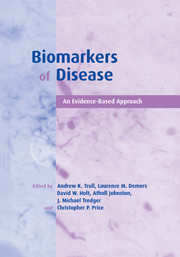Book contents
- Frontmatter
- Contents
- List of contributors
- Preface
- Part 1 Assessing and utilizing the diagnostic or prognostic power of biomarkers
- Part 2 Biomarkers of kidney disease and dysfunction
- 5 Biomarkers in renal disease
- 6 The genetics of renal disease
- 7 Early markers of nephrotoxicity for environmental and occupational monitoring
- 8 The early detection of renal impairment in diabetes mellitus. The case for microalbuminuria and other biomarkers
- Part 3 Biomarkers of bone disease and dysfunction
- Part 4 Biomarkers of liver disease and dysfunction
- Part 5 Biomarkers of gastrointestinal disease and dysfunction
- Part 6 Biomarkers in toxicology
- Part 7 Biomarkers of cardiovascular disease and dysfunction
- Part 8 Biomarkers of neurological disease and dysfunction
- Part 9 Biomarkers in transplantation
- Index
8 - The early detection of renal impairment in diabetes mellitus. The case for microalbuminuria and other biomarkers
Published online by Cambridge University Press: 20 August 2009
- Frontmatter
- Contents
- List of contributors
- Preface
- Part 1 Assessing and utilizing the diagnostic or prognostic power of biomarkers
- Part 2 Biomarkers of kidney disease and dysfunction
- 5 Biomarkers in renal disease
- 6 The genetics of renal disease
- 7 Early markers of nephrotoxicity for environmental and occupational monitoring
- 8 The early detection of renal impairment in diabetes mellitus. The case for microalbuminuria and other biomarkers
- Part 3 Biomarkers of bone disease and dysfunction
- Part 4 Biomarkers of liver disease and dysfunction
- Part 5 Biomarkers of gastrointestinal disease and dysfunction
- Part 6 Biomarkers in toxicology
- Part 7 Biomarkers of cardiovascular disease and dysfunction
- Part 8 Biomarkers of neurological disease and dysfunction
- Part 9 Biomarkers in transplantation
- Index
Summary
Several chronic diseases may be without major symptoms or signs for many years; complications in diabetes and hypertension, e.g. early diabetic nephropathy or renal dysfunction, are excellent examples of this important feature [1, 2]. Nevertheless, renal disease may often, without intervention, progress to end-stage renal failure with an eventual need for dialysis or transplantation [3–5]. In fact, diabetes is now one of the major causes of end-stage renal failure in the USA and in Europe, as well as in the rest of the world. In many dialysis units, 30–50% of patients are diabetics [6]. The number of patients with type 2 diabetes developing end-stage renal disease is clearly increasing, as recently reviewed by Ritz and Rychlik [7]. Uraemia in type 1 diabetes is also a major concern. On the other hand, complications of diabetes may be postponed, or hopefully eventually prevented, by early and more effective management [1, 8, 9].
Since there are only a few symptoms or signs of the early stage of the disease, biomarkers should serve to identify those patients at risk of developing renal disease. Together with other organ biomarkers, these should also be used for the evaluation of disease progression, especially with respect to defining the appropriate time-point for intervention. In addition, biomarkers may also be used to evaluate treatment effect [1]. Usually, long-term follow ups are needed to define clear benefits with respect to preventing organ damage and, more specifically, end-stage renal disease and mortality (Figure 8.1).
- Type
- Chapter
- Information
- Biomarkers of DiseaseAn Evidence-Based Approach, pp. 76 - 96Publisher: Cambridge University PressPrint publication year: 2002



